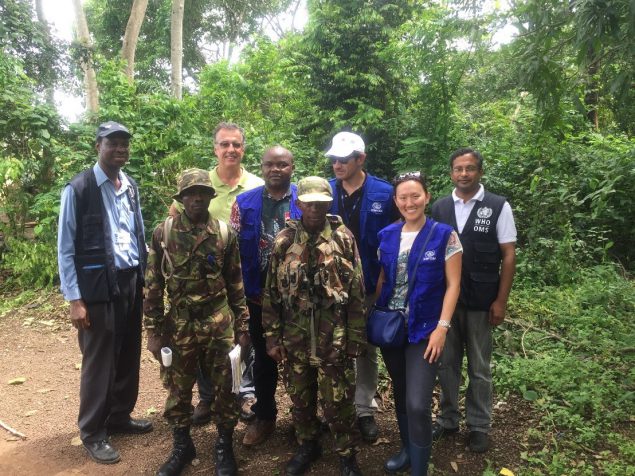Recommendations for Fully Vaccinated People
COVID-19 Homepage
One Man’s Passion for Migrant’s Health

Rodriguez-Lainz pictured back, second from the left, with a group he worked with while deployed in West Africa for the Ebola Response.
Dr. Alfonso Rodriguez-Lainz works at the CDC as an epidemiologist who is focused on health issues of migrant workers in the United States. As an immigrant himself, who moved to the United States from Spain in 1986, he says he has felt “called to serve immigrants” over his public health career.
Rodriguez-Lainz’s journey working in public health started at the State of California as a senior epidemiologist with the California Office of Binational Border Health. After working in that office for twelve years, he joined CDC’s Division of Global Migration and Quarantine in 2010. In 2016, Rodriguez-Lainz deployed to West Africa to help respond to the Ebola outbreak. He said he learned much from his first international deployment and looks forward to other deployments where his work could affect real-time public health emergencies.
He began his deployment in the COVID-19 response as part of the Global Migration Task Force (GMTF) in March of 2020. In the early days of the COVID-19 pandemic, he saw the opportunity to contribute and address the needs of underserved migrant essential workers.
Health equity was (and remains) a focus and concern for Rodriguez-Lainz.
“Some of the initial outbreaks in the beginning of the pandemic were in meat-packing plants and agriculture farms. Guess who is working in those settings? Mostly immigrants and refugees who often do not speak English,” he said.
Rodriguez-Lainz helped the response consolidate and focus its work with migrants and farmworkers, which crossed multiple task forces.
He worked on raising awareness of the migrant populations’ needs to access health information and preventive services. Additionally, he collaborated with the various task forces to collect data on at risk and underserved populations. Through this work, his passion toward addressing migrants’ health disparities has grown stronger.
“Immigrants and farmworkers are some of the most vulnerable members of our society,” he said.
After multiple requests for assistance from various states, the GMTF established a team to address the various needs of immigrant, refugee, and migrant populations in the United States, the Globally Mobile Populations team. Through CDC’s Public Health Crisis Cooperative Agreement, CDC awarded funds to NRC-RIM and a national organization that distributes them to various local organizations that have the appropriate outreach skills, established trust, and cultural and linguistic applications to assist migrant and farmworker populations.
“Working for CDC has provided me an amazing opportunity to improve and strengthen collaboration with my colleagues and partner organizations. Particularly in this response, I have been blessed with the ability to focus on farmworker issue and for the first time leading a national project.”
Rodrigues-Lainz leads a project called “Improving Clinical and Public Health Outcomes through National Partnerships to Prevent and Control Emerging Infectious Disease Threats.” Rodriguez-Lainz hopes that the CDC’s support will continue to sustain and expand this successful partnership.
The project provides CDC funding and technical support to a national network of more than 40 local farm worker-serving organizations to enhance their capacity to conduct COVID-19 outreach, education, and facilitate access to vaccination, testing, and isolation and quarantine facilities for farm-workers,” according to Rodrigues-Lainz. Participating organizations have provided 60,000 COVID-19 vaccine doses and COVID-19 education to almost 700,00 farmworkers and their family members. The organizations also distributed 500,000 pieces of personal protective equipment, including gloves and face masks. Rodrigues-Lainz hopes that CDC’s support will continue to sustain and expand this successful partnership. For more information on this project, please visit: http://www.ncfh.org/infectious_diseases.html
By removing barriers to access, Rodriguez-Lainz and his team hope to close the equity gaps associated with COVID-19.
Rodriguez-Lainz lives in San Diego, but many members of his CDC collaborators live in Atlanta. Thus, his workdays starts early (EST) and end at California time. During weekends he enjoys San Diego’s outdoors and good weather with his wife and two children. In the little free time he has, he mentors and teaches graduate students at the SDSU Graduate School of Public Health.
Rodriguez-Lainz says he has learned much from his time working on the COVID-19 Response’s GMTF, all which stem from the many challenges he and his team faced.
He hopes to be able to continue this work and extend it into building international projects and preparing for the next pandemic or emergency.
“What are we to do in year number three of our current pandemic?” he said, “While there is a great understanding that there are many response priorities, we’re determined to bring awareness and shine a light on migrant and farmworker communities.”